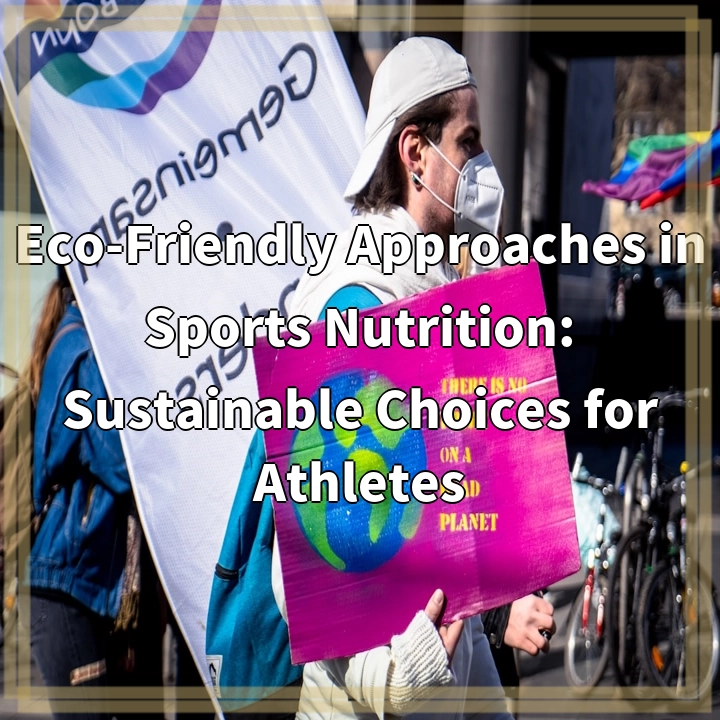
What it is:
Eco-friendly approaches in sports nutrition focus on sustainable practices that minimize the environmental impact of food production and consumption while meeting the nutritional needs of athletes. This involves selecting organic, locally-sourced, and plant-based foods, reducing food waste, and supporting ethical farming practices. The goal is to nourish the body effectively while simultaneously being mindful of the planet and the resources it offers.
Key Components of Sustainable Sports Nutrition
Effective eco-friendly sports nutrition emphasizes a holistic approach, which includes:
- Plant-Based Diets: Prioritizing fruits, vegetables, whole grains, nuts, and seeds to reduce carbon emissions associated with animal farming.
- Local Sourcing: Opting for seasonal and locally-grown produce to minimize transportation footprints and support local economies.
- Organic Foods: Choosing organic produce helps reduce harmful pesticide use and promotes healthier soil and ecosystems.
- Waste Reduction: Implementing strategies to minimize food waste, such as composting, meal planning, and proper food storage techniques.
Real-World Problems
Despite the benefits of eco-friendly approaches in sports nutrition, several challenges exist that hinder widespread adoption:
Environmental Impact of Conventional Agriculture
Conventional farming practices often rely on synthetic fertilizers, pesticides, and monocultures, leading to soil degradation, water contamination, and loss of biodiversity. Athletes and consumers alike can contribute to these issues inadvertently by not considering the source of their food.
Accessibility and Affordability
Organic and sustainably sourced foods can be more expensive than their conventional counterparts, making it challenging for many athletes to access eco-friendly options. Socioeconomic disparities can limit the choices available, leading to imbalances in nutrition quality.
Lack of Awareness
Many athletes may not be aware of how their food choices impact the environment or may not have the knowledge needed to transition to sustainable practices. Educational resources are essential to inform athletes about the benefits and strategies for incorporating eco-friendly nutrition.
Supply Chain Logistics
The complexity of the food supply chain can create obstacles for sourcing eco-friendly products. Infrastructure issues, distribution barriers, and seasonal availability can affect the consistency and reliability of accessing sustainable food.
Resistance to Change
Behavioural habits and traditional practices in sports nutrition can be deeply ingrained, leading to resistance when it comes to adopting new methods or ways of thinking about food. Convincing athletes to shift their mindset toward sustainability may require gradual change and supportive communities.

Solutions to Eco-Friendly Approaches in Sports Nutrition
Addressing the challenges associated with eco-friendly sports nutrition requires a multi-faceted approach. By implementing sustainable practices and fostering awareness, athletes can make informed choices that benefit both their health and the environment.
Promote Local and Seasonal Eating
One effective solution is to encourage athletes to prioritize local and seasonal foods. By shopping at farmers’ markets or joining community-supported agriculture (CSA) programs, athletes can access fresh, sustainable produce while supporting local farmers. This not only reduces the carbon footprint associated with food transport but also ensures nutrient-rich options.
Education and Awareness Campaigns
Increasing awareness about the benefits of eco-friendly nutrition is vital. Educational resources, workshops, and online campaigns can provide athletes with the necessary information about sustainable food choices, illustrating how these choices positively impact their performance and the environment.
Advocacy for Sustainable Practices
Athletes can be powerful advocates for sustainable practices. By sharing their experiences and the importance of eco-conscious choices through social media or public speaking engagements, they can inspire others in the sports community to consider the environmental impact of their diets.
Promoting Affordable Organic Options
To counter the issue of high costs associated with organic foods, initiatives should focus on making sustainable options more affordable. This may involve partnerships between local governments and organic farms to subsidize costs or creating bulk-buying groups that allow athletes to purchase sustainable foods at a reduced price.
Encouraging Food Waste Reduction
Implementing strategies to minimize food waste is crucial for sustainability. Athletes can practice meal planning, portion control, and proper storage techniques to ensure they utilize their food effectively. Additionally, composting food scraps helps return nutrients to the soil and reduces landfill waste.
Fostering a Community of Support
Create a community-oriented approach to eco-friendly nutrition by forming support groups or online forums. Here, athletes can share recipes, tips, and experiences related to sustainable eating, thus creating a culture of shared knowledge and motivation to embrace eco-conscious choices.















